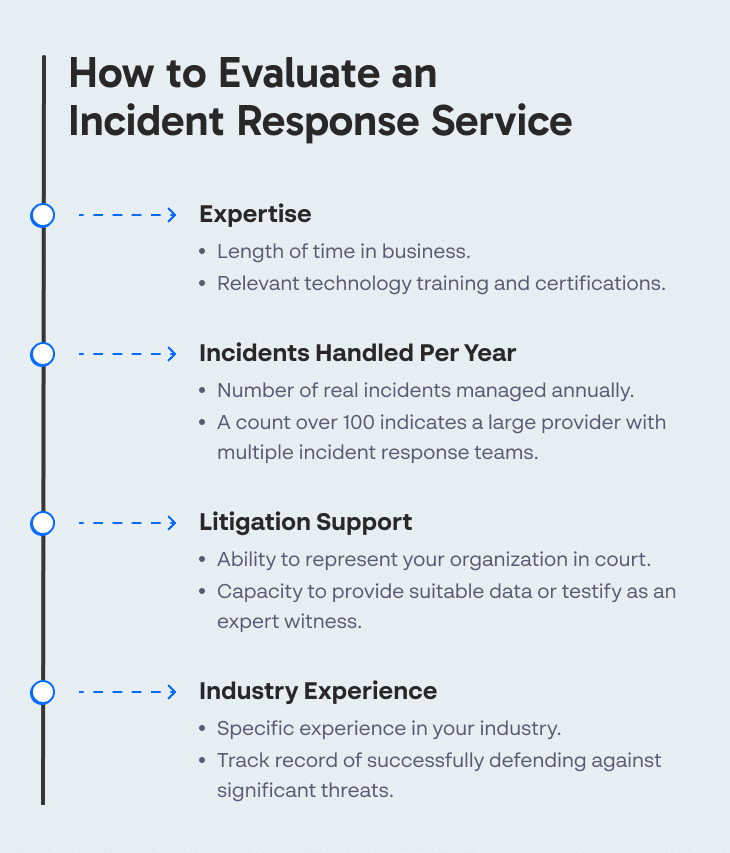Incident Response Services: Respond Faster to Any Incident
Incident response is a critical part of an organization’s security posture. Accurately detecting security incidents, and responding to them in a timely and effective manner is your first line of defense. Many organizations don’t have sufficient manpower or expertise in their in-house security team to guarantee 24/7 response to security incidents.
Outsourced incident response services can help you respond faster and react with appropriate mitigation and remediation measures for a large variety of security incidents.
This is part of an extensive series of guides about managed services.
Need an incident response provider?
Cynet is a trusted partner that analyses network and endpoint data, raises alerts, and protects against a wide range of known and zero day threats. Cynet provides CyOps, an outsourced incident response team on call 24/7 to respond to critical incidents quickly and effectively. Cynet can deploy its powerful endpoint detection and response (EDR) system across thousands of endpoints in up to two hours to effectively mitigate threats across an enterprise.
What are Incident Response Services?
Incident response (IR) services can help you detect and effectively respond to cyber threats. They usually operate based on an incident response retainer that specifies a fixed monthly cost and a certain scope of security services.
IT services can provide a Service Level Agreement (SLA) for responding to high-profile security breaches, and also provide the following elements that can help you be better prepared for cyber threats:
- Incident response preparation and planning—reviewing IT systems and establishing procedures for incident triage, defining an incident response plan.
- Incident triage and classification—reviewing security events, identifying real security incidents and their severity.
- Initial response—initial steps to contain, mitigate, and eradicate the threat.
- Post-breach assessment—root-cause analysis and further steps to prevent the threat from recurring, and obtain lessons learned from the breach or incident.
Here are a few examples of services that can be provided as part of an incident response service offering:
- Breach response SLA—service level agreement with 24/7 availability and a commitment to respond to a real security incident within a limited timeframe.
- Compromise assessment—confirms if internal IT systems are clean, using automated scans, manual threat hunting and penetration testing techniques. The output of the assessment is documentation of malware infections, misconfigurations, security risks, and software vulnerabilities discovered.
- Breach readiness assessment—evaluation of your security posture and readiness for specific types of cyber attacks. Identifies gaps and best practices you can implement to improve your readiness.
How to Evaluate an Incident Response Service?
You can check the following parameters of an incident response service to assess the quality and comprehensiveness of the services provided:
- Expertise—how long the provider has been in business, how many L1/L2/L3 analysts they employ, and what is their technology training and certifications.
- Incidents handled per year—how many real incidents the provider manages per year. Over 100 incidents indicates a large provide with multiple incident response teams.
- Litigation—can the provider represent you in a court of law by providing suitable data or testifying as an expert witness?
- Industry experience—does the provider have specific experience in your industry and have they successfully defended against your most significant threats?
Types of Incidents Handled
An incident response service can handle multiple levels of events—from critical incidents to minor events that still require a professional security response.
- Critical incidents: probably a breach
Incident impacting critical facilities or data that can affect company revenue or client base. Can include privileged account compromise, denial of service (DoS), unauthorized access and data exfiltration.
- Serious incidents: potential breach:
Incident affecting systems or data that are important for the organization but has no impact on revenues or the customer base. For example, policy violations, brute force attacks, social engineering, virus, or malware infection.
- Moderate event: low chance of breach
Incident affecting non-critical systems or data, typically affecting one or only a small group of users. Examples include spyware, unauthorized use of internal privileges. - Security event that requires investigation
Not a security incident, but an event that requires security involvement. For example, spam email, inappropriate content viewed by employees, content scraping.
Incident Response Services Benefits
Using an outsourced incident response service can provide several important benefits:
- Reduce response time and incident impact—an outsourced service with a guaranteed SLA can help you respond to major incidents faster, ensuring that attackers don’t have time to do major damage, compromise your most sensitive systems, or steal critical data. An incident stopped in its early stages is a catastrophic breach prevented.
- Experienced, battle-tested teams—incident response providers have IR teams that manage major security incidents on a daily basis, giving them highly valuable, fresh practical experience. In most in-house security teams, only the most experienced analysts have significant hands-on experience with security incidents, and even those that have practical experience may be “rusty”, because a long time passes between actual security incidents.
- Knowledge sharing—in-house security teams benefit from working together with outsourced incident responders. They can learn from cooperating on security incidents, and in many cases the IR provider will offer training for in-house staff as part of their service offering.
- Incident response technology—many incident response providers offer an automated incident response platform as part of their service offering, giving you the benefits of an advanced incident response technology without the cost and complexity of implementing a new technology in-house.
Cynet: Respond in Minutes to a Critical Cyber Attacks
Cynet provides a security platform that can be deployed in minutes across hundreds to thousands of endpoints to scan, identify and remediate threats. CyOps, Cynet’s managed detection and response team, is on call 24/7, allowing enterprises of all sizes to get access to the same expert security staff that protect the largest enterprises.
Cynet’s CyOps provides always-on incident response services, threat hunting, forensic investigations for breaches, and malware analysis to automatically prevent threats like malware, fileless attacks, Macros and LOLBins.
Contact Cynet for immediate help
For emergency assistance from Cynet’s security experts, call them at US 1-(347)-474-0048, International +44-203-290-9051.
See Additional Guides on Key Managed Services Topics
Together with our content partners, we have authored in-depth guides on several other topics that can also be useful as you explore the world of managed services.
MSP
Authored by Cynet
- [Guide] MSP Cybersecurity: 7 Best Practices to Protect Your Customers
- [Guide] Managed Service Provider Software: Top 5 MSP Solutions
- [Product] Cynet for MSPs | Cybersecurity Platform for Managed Service Providers
CDN
Authored by Imperva
- What is Anycast Routing | Anycast DNS | CDN Guide
- What is a Reverse Proxy Server | Reverse vs. Forward Proxy
- What is HTTP/2 | How it Differs from HTTP/1.1 and SPDY
MDR Security
Authored by BlueVoyant
Related Posts
Looking for a powerful, cost effective XDR solution?
- Full-Featured XDR, EDR, and NGAV
- Anti-Ransomware & Threat Hunting
- 24×7 Managed Detection and Response



